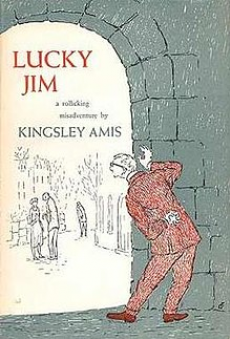
Email: reecejordan98@hotmail.co.uk
Total Article : 168
About Me:18-year-old sixth form student, studying English Literature, History and Government and Politics. My articles will broadly cover topics from the current affairs of politics to reviews of books and albums, as well as adding my own creative pieces, whether it be short fiction or general opinion.

‘Oh, lucky Jim,
How I envy him.
Oh, lucky Jim,
How I envy him.’
This is the song Kingsley Amis, the author of Lucky Jim, chose to include as the epigraph for his comedic breakthrough novel. But whether the protagonist, Jim Dixon, is worthy of envy or not is something thoroughly questionable. Landing in a job at a new red brick university out of convenience rather than passion (he flirted with the idea of school teaching but thought he couldn’t really be bothered), Jim is the unlikeliest of heroes.
His boss, Professor Welch, is a rambler who renders Jim into a vacant nodding dog; yet he must be appeased if Jim is to continue as a lecturer of Medieval history. The only problem is that Jim finds immense satisfaction in one-upmanship, and Welch’s son, the obnoxious Bertrand, is the perfect target. The latter’s girlfriend, the haughty and beautiful Christine, slowly begins to be the subject of Jim’s attraction. She edges out over Margaret, the uglier (as Jim constantly reminds us), more emotionally draining of the two who has just recently tried to kill herself after her ex-boyfriend treated her badly.
Lucky Jim is famous for its comedy. Christopher Hitchens, a best friend of Amis’s son and author, Martin, called the novel ‘the most hilarious of the second half of the twentieth century’. It’s quite the superlative, but it’s hard to argue with. Through Jim Dixon, Amis provides a scathingly honest critique about the at-times superfluous nature of the humanities at universities. One such moment sees Dixon mulling over his newly written article, and, happy with its fluffed-up contents of nothingness, sends it to be published. But the comedy is not always in the shape of critique. In the best moments of comedy, Amis has Jim involved in slapstick vignettes (the pulling away of someone’s chair before they sit down, the changing of one’s voice on the phone so as to mimic the pomposity of the press), which achieved more than the slight exhalation of air out of its reader. I must admit that at times it felt like I was reading an episode of Peep Show, in the best way possible. Like Mitchell and Webb, Amis has brilliant capacity for awkwardness, and in this case it usually revolves around authority and the acts we perform in its presence.
But the novel is not just brilliant for its comedy. Lucky Jim is about the little triumphs in life, the importance of being grounded, the grotesqueness of pomposity and pretentiousness. Through it all, we both laugh at and laugh with Jim – and we support him all the way.
Image Credits: wikipedia.co.uk

0 Comment:
Be the first one to comment on this article.